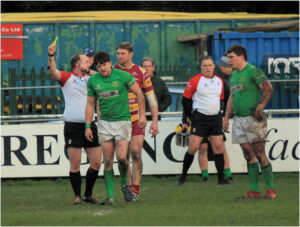How much does a yellow card cost a team in rugby?
Being reduced by a player for ten minutes after a yellow card is obviously a negative for a rugby team.

Worse still is for a player to see red and find themselves ejected for the remainder of the match, but to what extent does this impact a team?
In 2020, sports statistics company, Sports4Cast, analysed the impact of cards in rugby.
We've done some analysis on the effects on cards in rugby matches, and based on last week this seems like a good moment to share a thread …#GuinnessSixNations #RugbyUnited pic.twitter.com/Kzw8xcLqvA
— Rugby4Cast (@Rugby4Cast) March 17, 2022
CEO and co-founder, Graeme Acheson, said: “Everybody has anecdotally talked about a yellow card being a try, or seven points, but that always seemed far too much.”
During the 2022/23 Premiership Rugby regular season campaign, 152 cards were shown – 135 were yellow and 17 were red.
When a side is reduced to 14 players, they, unsurprisingly, find themselves scoring fewer points and conceding more than they generally would when playing with a full 15-player line-up.
The 2022/23 Premiership season saw teams during a ten-minute, or sin-bin length, period score an average of 3.44 points with 15 players.
When reduced to 14 players, this dropped to 2.23 points, and only 1.68 when playing with 13.
Conversely, a full team would concede an average of 2.97 points, with this figure growing to 4.91 points with 14 players, and as high as 9.5 points with 13 players.
This clearly shows that while it is more difficult to mount an attack with fewer players, it is even harder to defend an opposition.
Almost every side during the Premiership season found themselves conceding more and scoring fewer points when reduced to 14.
The exceptions to this were London Irish and Sale Sharks, who both scored more points when down a player, and Leicester Tigers, who conceded fewer.
Despite this, each side found themselves with a negative overall swing in points.
Simply, while a side may have scored more points when down a player, the rate at which they conceded still meant they had a net negative points balance during a sin-bin period than their expected rate with a full side.
By analysing points swings, it is possible to determine how well sides reacted to receiving a card.
Bristol Bears were the worst during these periods, who found themselves conceding an additional 7.42 points when down by one – the side conceding 66 points while failing to score during their accumulated 93 minutes with 14 players.
On the other end of the spectrum is Premiership finalists, Sale Sharks, whose points swing during a sin-bin period was a mere -0.68 points.
It should be noted that a reason for this disparity is that a large portion of Sale’s time spent with 14 players was with early red cards against Bath and Northampton Saints, which allowed them a longer period to adapt and counteract the effects being red carded.
Their 37-20 red card victory over Bath will have warped this figure, suggesting that Sale adapted better, when it is likely they would have won by an even greater margin were Nick Schonert not been sent off.
Sides must adapt to this, as explained by Carrick Blake, head analyst of Championship outfit, Cambridge, teams pick out players they know are likely to give away penalties and cards.
He said: “There are some games where they might have a guy with a bit of a hot head, and we go and target them. It’s paid dividends before.
“Everyone gets a bit excited when you’ve got an extra man, because it gets that little bit easier, but you shouldn’t change the process that got you the card in the first place.”
Having received a yellow card, teams will often resort to time-wasting tactics to help reduce its impact.
He said: “Scrums take twice as long when you’ve got a yellow card, because you stand up or collapse it, and the ref doesn’t want to give a decision, so you’re only playing for three minutes of rugby when you should be playing five or six.”
Sides suddenly find themselves more exploitable when carded, making any pre-existing weaknesses more exposed – this means defending becomes more difficult and the risk of conceding points greater.